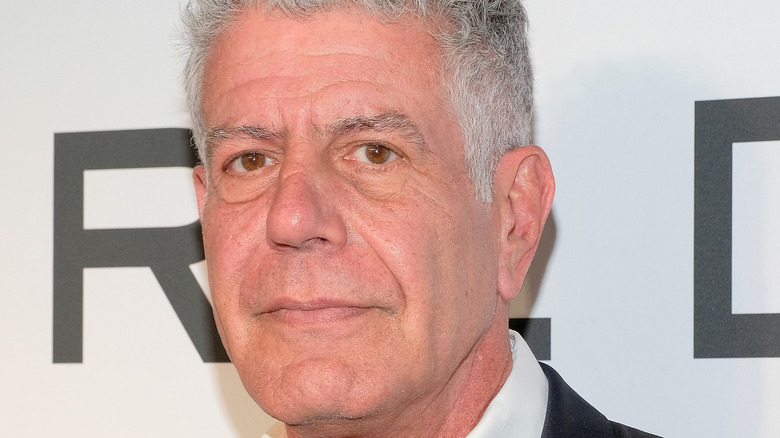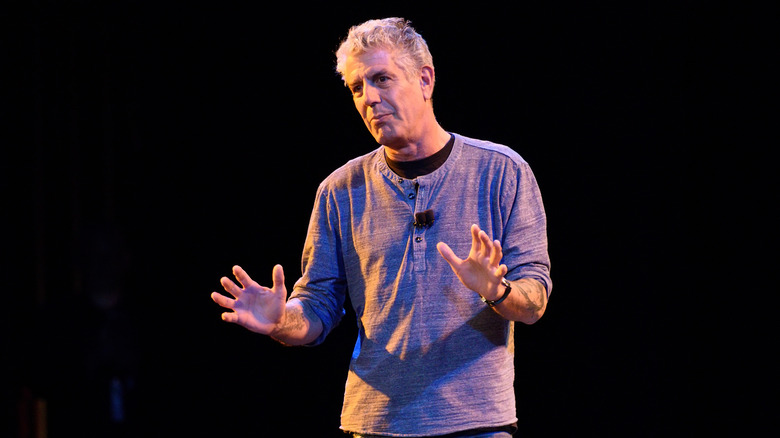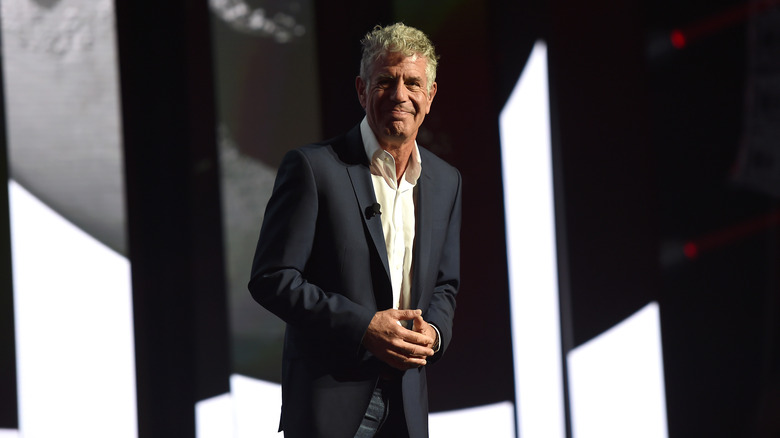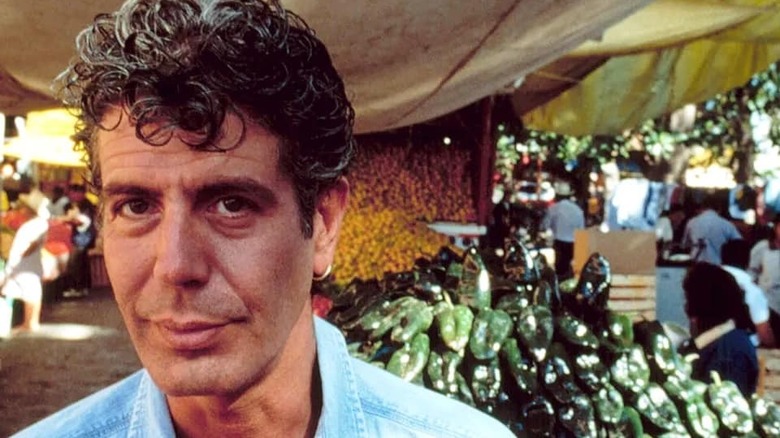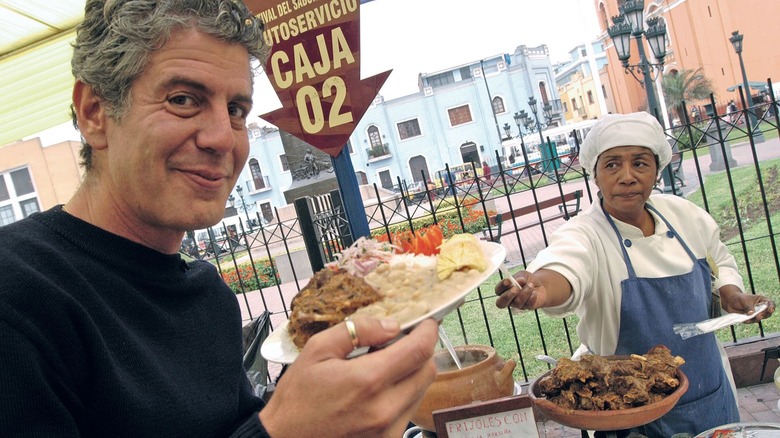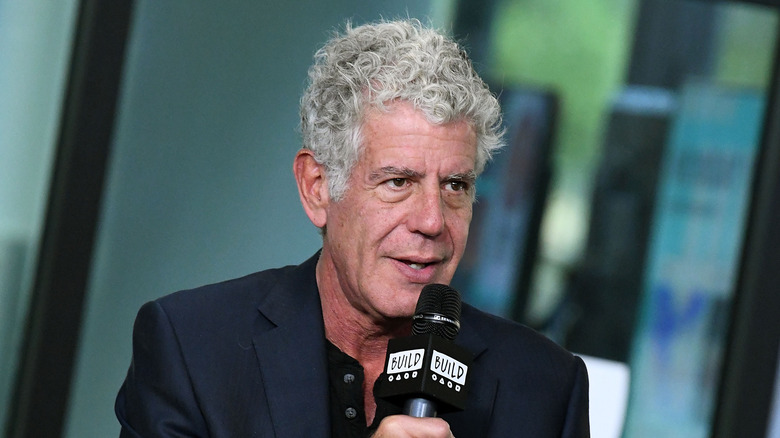The Untold Truth Of Anthony Bourdain's A Cook's Tour
"I mean, to be honest, I'm not totally alone," Anthony Bourdain admits in an outtake from the Vietnam episode of "A Cook's Tour." As he continues, "Because clearly somebody is shooting this. I always love those, like, desert scenes, 'I'm alone in the desert.' Yeah, but who else's footprints are those?" This scene, GQ's Brett Martin claims, is the most important moment in the recently released film "Roadrunner," a documentary about Anthony Bourdain's life.
For Martin, this scene highlights how Bourdain existed almost as a public property, always under scrutiny. However, it also returns importance to an often overlooked series: the subtle but powerful "A Cook's Tour," Bourdain's first television show that had him traveling the world in the hunt of "the perfect meal."
Before it, Bourdain may have been the author of his life-changing tell-all "Kitchen Confidential," but he was still little more than the strung-out chef described in his memoir. It was during "A Cook's Tour" however that Anthony Bourdain became the personality the world came to know. Even more than "Parts Unknown" or "No Reservations," it's "A Cook's Tour" that warrants a true examination.
Bourdain didn't envisage a television show
While the book "Kitchen Confidential" is key to knowing his story, the image of Anthony Bourdain is much more tied to his many appearances on the television screen. Even then, he brought a writerly attitude towards what subjects he would pursue and honing the scripts for his voiceover parts synopsizing certain scenes.
Yet when "A Cook's Tour" producers Lydia Tenaglia and Christopher Collins reached out to Bourdain to pitch him on the idea as he still worked at New York restaurant Les Halles, Bourdain seemed unimpressed. "He's like, 'Yeah, sure, whatever,'" Tenaglia remembered in an interview with The Ringer. During their pitch about the project, she and Collins realized that Bourdain's main interest was that it would allow him to travel and gather material for his next book — but the television show interested him very little.
These differing interests initially fought each other. The producers have said that the writer side of Bourdain simply wanted to try food and then write about his impressions afterwards. A television program, however, is a different medium that needs more forethought. But, as the shooting for the series progressed, Bourdain began to take a more proactive role: "He was writing ideas and lines before we even got there. Because he had a greater understanding of what he was gonna get. Which is really kind of beautiful," recalled Tenaglia. From here, the authorial vision that marks Bourdain's later programmings would soon unfold.
The aesthetics of Bourdain were established with "A Cook's Tour"
By the final seasons of his later show "Parts Unknown," Bourdain was a well-oiled machine, and the shows he created had a strong, established aesthetic that had a uniform feeling. Hyperallergic described the vibe as a mixture of poetry and noise, "starting with the punchy opening title sequences set to guitar-heavy music, which splatter images of the chef eating and exploring in rapid succession. All focus on sound as fundamental to the dining experience, paying attention to the chatter of patrons, the screech of cars on streets, the vibrancy of city centers." And all of this slightly muted under his voiceovers that ranged from a Gonzo-style bravado to more meditative thoughts.
Reading reviews from the time, however, one finds that "A Cook's Tour" (which ran on Food Network from 2002-2003) appeared with many of these choices already in place. In fact, Hyperallergic describes all of Bourdain's shows as one continuum with "A Cook's Tour" serving as an unformed punkish beginning.
When Variety covered the 2002 Tokyo episode, they noted that, "For once, Food Network is putting on display food you can't do at home — and they show that acquiring the ingredients isn't all pretty before the meal hits the dining room table." The sushi segments reveled in flashy knife techniques that encapsulated the artistic value of the food and a part about sumo wrestlers bulking up carried the feeling of finding out about something secret. Bourdain's later shows may have refined their techniques, but the vision was present from the beginning.
The biggest challenge was Bourdain becoming Bourdain
As the movie "Roadrunner" repeatedly shows, Bourdain always thought of himself as a writer who happened to use travel shows as his medium. The other thing that the documentary reveals is that his earliest show "A Cook's Tour" also forged the long-lasting character of Anthony Bourdain that the world came to love.
The Daily Beast begins their review of "Roadrunner" by summarizing an outtake from the Tokyo episode of "A Cook's Tour." Sitting in a private room, Bourdain eats silently. He pauses and simply comments, "Oh, wow, spectacular." He continues to eat silently. This laconic commentary, as they noted, was also matched with a reticence to speak to new people, which seems anti- everything we now know about Bourdain and would have made filming shows like "Parts Unknown" impossible. So what changed?
The revelation that he could apply his writing to travel television caused Bourdain to develop the swagger that viewers fell in love with. Or, as "Roadrunner's" director Morgan Neville told The New Yorker: "He played himself on television." Playing himself as a character, however, meant removing almost all boundaries between Bourdain the person and Bourdain the personality. The conflation of the two later instilled a sense of agoraphobia in Bourdain as he could never go anywhere without being recognized for the role he wrote and performed for television.
The experience of "A Cook's Tour" ruined his first marriage
The turning point of "A Cook's Tour," producers Collins and Tenaglia told The Ringer, was the Vietnam episode. "Suddenly he was firing on all cylinders with all these frames of reference." In the documentary, as mentioned in NPR's review, they rationalized that since Bourdain had spent his entire life as a cook in New York City, he only envisaged the world through the romantic lens of the books and films with which he had engaged.
This attitude was destructive in two ways. First, as places failed to live up to his imagination, Bourdain felt compelled to search for more. Second, when places did live up to his imagination, the world he saw previously faded. The latter effect happened in Vietnam.
"Vietnam was just like the books," he told The Guardian in 2006. "Just like the movies, only better. The guileless generosity of strangers, waking up smelling those smells, seeing those sights ... I was almost ready to believe in God." Returning to the United States afterwards proved a massive withdrawal however. "Everything was flat. Everything," he added in the piece. This included his relationship with Nancy, his first wife. The marriage ended a couple years later.
Of course, there were probably other factors involved, but the revelation that "A Cook's Tour" gave Bourdain — that the world out there made his previous life appear pale in comparison — seems to have prompted the final break.
The show ended early on, but it informed everything he did after
In Hyperallergic's take on the "Roadrunner" documentary, the outlet offered the idea that all of Bourdain's shows were part of a single continuum. Certainly, they had different names and different channels hosted them, but they all featured the same Bourdain, the same crew, and the same interests.
Of course, "A Cook's Tour" didn't last long on The Food Network as the channel and Bourdain butted heads about the show's vision. After a couple of seasons, network executives offered the idea that Bourdain should stick to American dishes like barbecue that were attracting their viewers more than far-flung destinations. Moreover, as Bon Appétit details, the network refused to fund a trip to Spain, where Bourdain had been invited by the famous chef Ferran Adriá. So, Bourdain left Food Network and insulted it at every opportunity he had to throw in a jab.
Formally, "A Cook's Tour" ended with that departure. Except it also sort of didn't as the follow-up show, "No Reservations," went ahead and visited Adriá in Barcelona and "A Cook's Tour" morphed into the new series. And maybe it was for the best.
By the time Bourdain left Food Network, he had grown comfortable in the role of Anthony Bourdain the character and the host. He had found his voice and vision, and if one channel didn't want to host him, he would take his honed skills to another channel and continue increasing his fame. By then, Anthony Bourdain had arrived.
